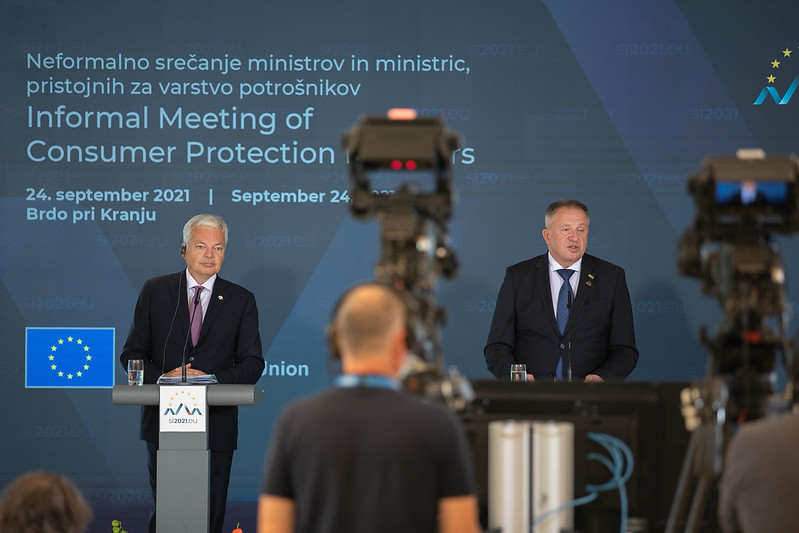At an informal meeting held on 24 September 2021 at Brdo pri Kranju, ministers responsible for consumer protection discussed how to enhance consumer protection for future generations in the age of digitalisation and tourism.
The global dimension of the COVID-19 pandemic has spurred on the digitalisation and rapid growth of commerce and financial services, while the tourism sector has experienced a severe downturn and come to a complete standstill. Enforcing consumer rights in these areas has become a challenge that needs to be properly addressed, stressed Minister Počivalšek at the beginning of the meeting. He said that the key challenges are managing new risks stemming from technological advances in online financial services and dealing with the sharp increase in online sales of products. “In addition to ensuring that products on the market are safe – be they products sold online or in physical stores – our common goal should include creating a well-functioning internal market in consumer credit by ensuring the best possible conditions for the free movement of such services, while at the same time working towards maximum consumer protection,” he emphasised.
The ministers welcomed the proposal for a regulation on general product safety, which takes into account important objectives in terms of ensuring safe products in the single market. The new challenges emerging in consumer protection that must be addressed include changes in consumer habits, the sharp increase in online sales of products and the management of new risks brought about by technological advances. Ensuring that only products that are safe – irrespective of whether they are sold online or in physical stores – are available on the market is a key objective that we must pursue in this area. In this respect, it is important to strike a balance between the regulations in force and those in the pipeline.
Over the last two years, more and more new providers and new types of consumer credit have been appearing on the consumer credit market. Ignorance of how online platforms work and unfamiliarity with new types of credit agreements can very quickly lead to serious harm to consumers, agreed the ministers, stressing that the proposal for a directive on consumer credit indicates a step in the right direction.
On tourism, the ministers agreed there was first a need to examine and assess all possible shortcomings of the current Package Travel Directive. They emphasised that EU member states support examining the appropriateness of the current Package Travel Directive, as the epidemic has shown it to be unsuitable in the exceptional circumstances that both consumers and businesses have faced and continue to face.
Commissioner Reynders stressed that the European Commission wants to restore consumer confidence in consumer credit and ensure that this sector works for the consumer and not against them. The General Product Safety Directive needs to be recast as it is not suitable for the digital age – in fact, more than 70% of today’s consumers shop online. To this end, the European Commission has issued two legislative proposals in the area of consumer protection, namely the proposals for a directive on consumer credit and a regulation on general product safety, which have already been announced in the context of the New Consumer Agenda. “The European Commission has launched a review of the Package Travel Directive and will analyse whether there is a need for further harmonisation in relation to insolvency procedures and specific rules on the refund of paid package travel”, concluded the Commissioner.
Minister Počivalšek, in his capacity as Chair, brought the meeting to a close by saying: “It has become clear that we need swift, effective and united action at EU level to respond to the crisis. Ensuring that consumer rights are respected is a key responsibility of EU member states and I am confident that with the right legislation we will achieve better consumer protection for future generations.”
The event was co-financed by the European Union.
Source: gov.si


